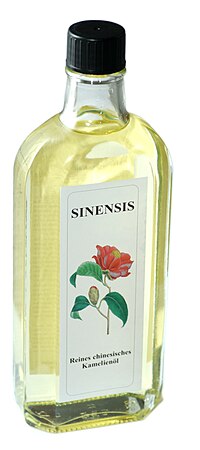
Comparative Transcriptomic Analysis Reveals Regulatory Mechanisms of Theanine Synthesis in Tea (Camellia sinensis) and Oil Tea (Camellia. oleifera) Plants.
Sign Up to like & getrecommendations! Published in 2019 at "Journal of agricultural and food chemistry"
DOI: 10.1021/acs.jafc.9b02295
Abstract: Tea provides a rich taste and has healthy properties due to its variety of bioactive compounds, such as theanine, catechins and caffeine. Theanine is the most abundant free amino acid (40%70%) in tea leaves. Key… read more here.
Keywords: oil tea; tea camellia; regulatory mechanisms; mechanisms theanine ... See more keywords

The reference genome of Camellia chekiangoleosa provides insights into Camellia evolution and tea oil biosynthesis
Sign Up to like & getrecommendations! Published in 2022 at "Horticulture Research"
DOI: 10.1093/hr/uhab083
Abstract: Abstract Camellia oil extracted from Camellia seeds is rich in unsaturated fatty acids and secondary metabolites beneficial to human health. However, no oil-tea tree genome has yet been published, which is a major obstacle to… read more here.
Keywords: biosynthesis; oil tea; oil; camellia chekiangoleosa ... See more keywords

Leaf transcriptome analysis of a subtropical evergreen broadleaf plant, wild oil-tea camellia (Camellia oleifera), revealing candidate genes for cold acclimation
Sign Up to like & getrecommendations! Published in 2017 at "BMC Genomics"
DOI: 10.1186/s12864-017-3570-4
Abstract: BackgroundCold tolerance is a key determinant of the geographical distribution range of a plant species and crop production. Cold acclimation can enhance freezing-tolerance of plant species through a period of exposure to low nonfreezing temperatures.… read more here.
Keywords: oil tea; tea camellia; wild oil; camellia ... See more keywords

Orthogonal test design for optimizing culture medium for in vitro pollen germination of interspecific oil tea hybrids.
Sign Up to like & getrecommendations! Published in 2021 at "Anais da Academia Brasileira de Ciencias"
DOI: 10.1590/0001-3765202120190431
Abstract: Oil Tea (Camellia oleifera) is an important woody edible oil plant in China. Oil Tea suffers from low rate of fruit set during production, which is related to poor pollination and fertilization. Pollen vigor is… read more here.
Keywords: medium; oil tea; pollen germination; oil ... See more keywords

Comparison of the Chloroplast Genome Sequences of 13 Oil-Tea Camellia Samples and Identification of an Undetermined Oil-Tea Camellia Species From Hainan Province
Sign Up to like & getrecommendations! Published in 2022 at "Frontiers in Plant Science"
DOI: 10.3389/fpls.2021.798581
Abstract: The comparison of chloroplast genome (cpDNA) sequences among different plant species is an important source of plant molecular phylogenetic data. In this paper, the cpDNA sequences of 13 different oil-tea camellia samples were compared to… read more here.
Keywords: cpdna; camellia; tea camellia; oil tea ... See more keywords

Predicting Potential Distribution and Evaluating Suitable Soil Condition of Oil Tea Camellia in China
Sign Up to like & getrecommendations! Published in 2018 at "Forests"
DOI: 10.3390/f9080487
Abstract: Oil tea Camellia, as a major cash and oil crop, has a high status in the forestry cultivation systems in China. To meet the current market demand for oil tea Camellia, its potential distribution and… read more here.
Keywords: soil; tea camellia; oil tea; oil ... See more keywords

Assessment of the Genetic Relationship and Population Structure in Oil-Tea Camellia Species Using Simple Sequence Repeat (SSR) Markers
Sign Up to like & getrecommendations! Published in 2022 at "Genes"
DOI: 10.3390/genes13112162
Abstract: Oil-tea camellia trees, the collective term for a class of economically valuable woody oil crops in China, have attracted extensive attention because of their rich nutritional and pharmaceutical value. This study aimed to analyze the… read more here.
Keywords: oil tea; oil; ssr markers; camellia ... See more keywords

Comparisons of Chloroplast Genome Mutations among 13 Samples of Oil-Tea Camellia from South China
Sign Up to like & getrecommendations! Published in 2023 at "Genes"
DOI: 10.3390/genes14051083
Abstract: The differences in cpDNA SNPs and InDels of 13 samples from single trees of different species or populations of oil-tea camellia in South China were examined in this study, and phylogenetic trees were reconstructed based… read more here.
Keywords: tea camellia; among samples; oil tea;

Evolutionary Adaptation of Genes Involved in Galactose Derivatives Metabolism in Oil-Tea Specialized Andrena Species
Sign Up to like & getrecommendations! Published in 2023 at "Genes"
DOI: 10.3390/genes14051117
Abstract: Oil-tea (Camellia oleifera) is a woody oil crop whose nectar includes galactose derivatives that are toxic to honey bees. Interestingly, some mining bees of the genus Andrena can entirely live on the nectar (and pollen)… read more here.
Keywords: oil tea; oil; tea specialized; galactose derivatives ... See more keywords

Transcriptome Analysis of Colletotrichum fructicola Infecting Camellia oleifera Indicates That Two Distinct Geographical Fungi Groups Have Different Destructive Proliferation Capacities Related to Purine Metabolism
Sign Up to like & getrecommendations! Published in 2021 at "Plants"
DOI: 10.3390/plants10122672
Abstract: Anthracnose, caused by Colletotrichum spp., is a significant disease affecting oil tea (Camellia oleifera Abel.). Extensive molecular studies have demonstrated that Colletotrichum fructicola is the dominant pathogen of oil tea anthracnose in China. This study… read more here.
Keywords: metabolism; purine metabolism; oil tea; fructicola ... See more keywords